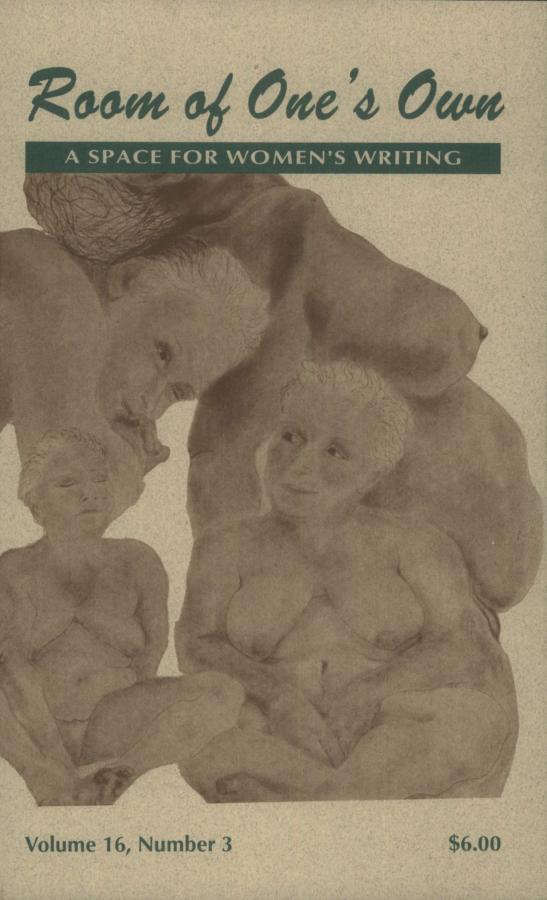
Memoirs of a Book Molesting Childhood and Other Essays
Adele Wiseman
Oxford University Press, Toronto. c 1987
Paperback 200 pps. Price $13.95
This
is an impressive collection of essays by one of the grande dames of
Canadian letters, a literary coeval of Margaret Laurence; indeed, their
writing careers paralleled each other's, and theirs has been a long and
warm friendship. Although Ms. Wiseman has never quite been recognized
as having the same literary stature as her friend, her talents are
formidable - as a writer demonstrating the ability to etch sharp images
with the added cachet of indelible wit as is readily evidenced by the
mischievous sparkle and delicate tracery of description in her nostalgic
second essay "Old Markets, New World."
Ms. Wiseman, a native of
Winnipeg where she lived with her family and her equally-book-hungry
siblings, inhabited the world of fantasy, possibilities, and ultimate
disillusion in that city. She is the author of two novels, the first of
which, The Sacrifice, won her the Governor General's Award. She is currently a teacher and lecturer, living in Toronto.
This
is a diverse collection of essays. Their very diversity, however,
demonstrates a wide-ranging intellect and sharp intuition, coupled
happily with an ability to paint evocative, sly and teasing impressions
for the reader's delectation. Some of the essays were published
previously and I found myself curious as to where each essay had seen
publication, when it was written and the impetus for its birth. A short
note prefacing each would have been helpful in clearing up the mystery
for me.
The first essay, the title-piece of the collection, drew
me immediately into its warm and cherished embrace. For it quickly
evoked a response in me born of familiarity. Which lover of books and
literature has not experienced some of Wiseman's perceptions? Sneaky
mealtime, schooltime, bedtime excursions into fiction backgrounded my
own childhood and that of countless others. But Ms. Wiseman adds her
superb craft in recalling ineluctable experience for her own pleasure,
and ours. The clarity of her prose diction evokes one's own memory with
the sharp aroma of remembrance; so much so that this reader felt
astonished that this writer, whom I have never personally met, could
somehow 'know' my own experience so intimately. Her tender guidance in
recalling the vital and all-consuming need to read was uncanny. At that
time, to read was indeed to exist; necessity and final purpose, a means
by which one rushed headlong into life.
But there is also the
unhappiness of a coming-to-maturity, realizing that the written word can
be, and is, used to manipulate, to perpetuate unjustness, conformity,
and outmoded attitudes and systems, racial stereotypes and class
structures.
Adele Wiseman's lifelong passion for books had led
her to the conclusion that her mind has been refined through the reading
crucible to the attainment of purity; of thought, discernment, decision
and discrimination. Her one great regret lies in the realization that
books, with all their profundities and inanities, cannot be the
salvation of mankind. They can, and will, however, remain the lodestone
of human knowledge, hopes and aspirations. In each new book one
approaches, resides the potential of epiphany.
In the following
essay, an absolute delight to read, she draws back the curtain of her
memory to let us glimpse the Winnipeg Market of years past, redolent of
schmaltz herring, crisp pickles, golden corn and blood-ripe tomatoes.
She evokes roistering activity, vivid colour and earthy odours. Again,
it is her pen, no one else's which so clearly evokes the long-forgotten/newly-remembered.
Uncle
owned a horse which the young Adele viewed akin to a "cousin". Uncle
discarded nothing, thrifty soul, gifting his sister's household with
gilt-red oranges (sprouting mould) in summer, frozen hens in winter, and
orange wrappings year 'round for, as she put it, a final Sunkist wipe
... at a time when bathroom tissue was an unthought-of luxury.
This
is the work of an excellent writer, able to pass easily from the
lyrical to the prosaic. This reader, for example, discovered the first
essay to be utterly lyrical and intensely emotional in its excess of
feelings; the love of knowledge (and the occasional jolts of reality)
thrusts itself to the level of high consciousness in a burst of
exhilaration. Anyone reading this essay with even a faintly similar
background in the discovery of the wonderland of reading will readily
throb to the appeal of a remembered fascination.
The essay,
however, titled "What Price the Heroine", a feminist-writer's
interpretation of the social mores which informed Henry James' The Portrait of Lady,
while a good piece, is also a self-indulgent exercise for the feminist,
writer or not. A piece of fiction should be recognized on its merits,
regardless of how we later decry the social conditions which led to its
expression. While well written, I found it a dry, academic exercise.
I
found the essay "How to Go to China: Core Sample from the Continuous
Journey" a most interesting bit of reminiscence. Both because I had
been fortunate myself to travel and live for a time in the Orient, and
because the essay explores impressions and relates the experiences of a
coterie of some of Canada's best-beloved writers, travelling as guests
of a group of Chinese writers. The observations, impressions, the
ultimate kinship and understanding achieved are happy reading. For me,
it was like eavesdropping on literary royalty, and I loved it.
c. 1988 Rita Rosenfeld
published in Outlook, Vol.26, No.6-7
No comments:
Post a Comment